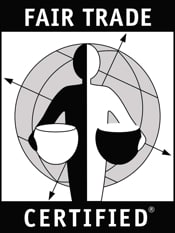What Does Fair Trade Certified Mean?
via The Good Human by david on 2/4/10
I am sure you have come across the sign for Fair Trade goods, but do you know what it means? The logo shown below is for marking products that have been Fair Trade Certified. Many people think it is just fair wages for goods created, but it means a lot more than that. The Fair Trade movement promotes standards for fair labor standards, environmentalism, social policy, fair pricing, and community development. The "official" declaration of what Fair Trade is comes from FINE, an informal association of the four main fair trade networks (Fairtrade Labelling Organizations International, International Fair Trade Association, Network of European Worldshops and European Fair Trade Association):
Fair Trade is a trading partnership, based on dialogue, transparency and respect, that seeks greater equity in international trade. It contributes to sustainable development by offering better trading conditions to, and securing the rights of, marginalized producers and workers – especially in the South. Fair Trade Organizations, backed by consumers, are engaged actively in supporting producers, awareness raising and in campaigning for changes in the rules and practice of conventional international trade.

So how does a product become Fair Trade Certified? The standards are set by FLO International (Fairtrade Labelling Organizations), and a certification body, FLO-CERT, and the system involves independent auditing of producers to ensure the agreed standards are met. Once products meet the standards, they can apply to use the Fair Trade logo.
In the United States, bananas, honey, coffee, oranges, cocoa, cotton, dried and fresh fruits and vegetables, juices, nuts and oil seeds, quinoa, rice, spices, sugar, tea, herbs, and wine can all be found Fair Trade Certified. Overseas, you can also get Fair Trade Certified flowers, cotton, honey, sports balls, and beer. One thing to keep in mind though is that Fair Trade certification does not guarantee that a product was organically grown. Although farmers that are certified are probably more likely to farm organically, there is no guarantee as such.
By buying Fair Trade Certified products, you are helping farmers lift themselves out of poverty by investing in their farms and communities, protecting the environment, and developing the business skills necessary to compete in the global marketplace. To be exact, you are helping to encourage the following principles:
Fair price: Democratically organized farmer groups receive a guaranteed minimum floor price and an additional premium for certified organic products. Farmer organizations are also eligible for pre-harvest credit.When you are in the market for any of the products I listed above that can be certified Fair Trade, be sure to try to get them that way. A great place to learn way more about Fair Trade than I could ever possibly put here is the Transfair.org website. They also have a handy-dandy page for finding Fair Trade goods in your area, which I have used to find various products that maybe were not sold in my local store.
Fair labor conditions: Workers on Fair Trade farms enjoy freedom of association, safe working conditions, and living wages. Forced child labor is strictly prohibited.
Direct trade: With Fair Trade, importers purchase from Fair Trade producer groups as directly as possible, eliminating unnecessary middlemen and empowering farmers to develop the business capacity necessary to compete in the global marketplace.
Democratic and transparent organizations: Fair Trade farmers and farm workers decide democratically how to invest Fair Trade revenues.
Community development: Fair Trade farmers and farm workers invest Fair Trade premiums in social and business development projects like scholarship programs, quality improvement trainings, and organic certification.
Environmental sustainability: Harmful agrochemicals and GMOs are strictly prohibited in favor of environmentally sustainable farming methods that protect farmers' health and preserve valuable ecosystems for future generations.





Ça peut en effet devenir embêtant de savoir à quoi correspondent ces certifications... merci pour la clarification !
ReplyDelete